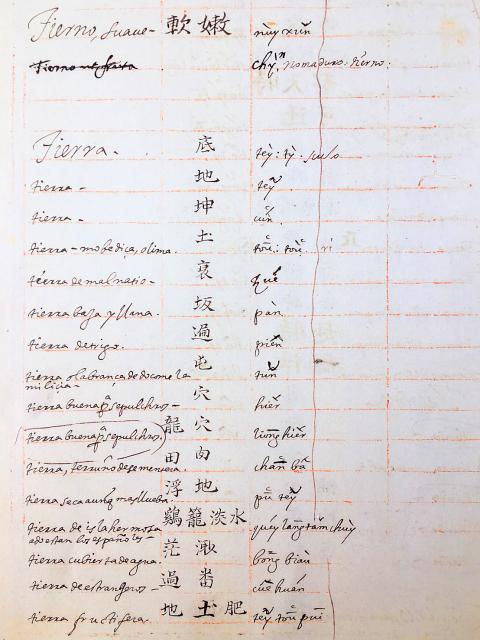A research team composed of Taiwanese and Spanish researchers yesterday discovered a lexicon that provides important clues about the development of Hoklo (commonly known as Taiwanese) in Taiwan during the 17th century.
The researchers said the 1,000-page lexicon titled The Vocabulary of the Language of Changchou (漳州話詞彙) contains 20,000 entries of words in use at the time of the Spanish occupation of Taiwan in 1620.
Researchers discovered the text while conducting research at the University of San Tomas in Manila.

Photo: Yang Chin-chieh, Taipei Times
Academia Sinica assistant researcher Chen Tsung-jen (陳宗仁) said the government’s “new southbound policy” is not a new idea, citing the travels of Hoklo speakers from southern Fujian Province to what is now the Philippines and Indonesia more than 400 years ago.
Chen said the text gives insight into what those Hoklo speakers encountered on their travels, adding that the text also provides evidence that the development of Hoklo stabilized at around that period in history, as it contains many expressions that are still in use.
“Hoklo has more than 1,000 years of history, having been in use since just after the Song dynasties. It is a shame to call it simply a ‘dialect.’ It has speakers in the Philippines, China, Malaysia and Singapore, and provides an important link with Southeast Asia,” Chen said.
National Tsing Hua University Department of History associate professor Lee Yu-chung (李毓中) said the text could also explain commonly misunderstood Hoklo terms.
The definitions are written using a combination of romanized Hoklo, romanized Mandarin, Chinese characters and Spanish, Lee said, adding that one-third of the definitions include annotations written using the official local language of the time.
“These annotations will really help with understanding the overall content,” Lee said.
Some expressions found in the text such as “washing one’s front door’s lintel” (se bun hong, 洗門風), meaning to publicly shame oneself out of regret over damaging another person’s honor, and the Hoklo term for “tears” (bak sai, 目虱) are still in use today, while other expressions found in the text are defined slightly differently from modern usage, Chen said.
The text also provides evidence about Spanish perceptions of the island, citing references to Keelung and Tamsui as “Spanish territory on Isla Hermosa,” he added.
“In the future when films are made about The Kingdom of Tungning, we will know how to portray certain behaviors and how to write dialogue for those cursing at others,” Chen said, adding that it also helps with understanding differences in Hoklo between Taiwan and Southeast Asia.
The team, which includes researchers from Academia Sinica, National Tsing Hua University, Spain’s University of Seville and Pompeu Fabra University in Barcelona, said the text represents the most comprehensive material discovered so far on 16th and 17th-century Hoklo vocabulary.

Taiwan is to commence mass production of the Tien Kung (天弓, “Sky Bow”) III, IV and V missiles by the second quarter of this year if the legislature approves the government’s NT$1.25 trillion (US$39.78 billion) special defense budget, an official said yesterday. Commenting on condition of anonymity, a defense official with knowledge of the matter said that the advanced systems are expected to provide crucial capabilities against ballistic and cruise missiles for the proposed “T-Dome,” an advanced, multi-layered air defense network. The Tien Kung III is an air defense missile with a maximum interception altitude of 35km. The Tien Kung IV and V

The disruption of 941 flights in and out of Taiwan due to China’s large-scale military exercises was no accident, but rather the result of a “quasi-blockade” used to simulate creating the air and sea routes needed for an amphibious landing, a military expert said. The disruptions occurred on Tuesday and lasted about 10 hours as China conducted live-fire drills in the Taiwan Strait. The Civil Aviation Administration (CAA) said the exercises affected 857 international flights and 84 domestic flights, affecting more than 100,000 travelers. Su Tzu-yun (蘇紫雲), a research fellow at the government-sponsored Institute for National Defense and Security Research, said the air

A strong continental cold air mass is to bring pollutants to Taiwan from tomorrow, the Ministry of Environment said today, as it issued an “orange” air quality alert for most of the country. All of Taiwan except for Hualien and Taitung counties is to be under an “orange” air quality alert tomorrow, indicating air quality that is unhealthy for sensitive groups. In China, areas from Shandong to Shanghai have been enveloped in haze since Saturday, the ministry said in a news release. Yesterday, hourly concentrations of PM2.5 in these areas ranged from 65 to 160 micrograms per cubic meter (mg/m³), and pollutants were

Taiwan’s armed forces have established response protocols for a wide range of sudden contingencies, including the “Wan Chun Plan” to protect the head of state, the Ministry of Defense (MND) said today. After US President Donald Trump on Saturday launched a series of airstrikes in Venezuela and kidnapped Venezuelan President Nicolas Maduro, concerns have been raised as to whether China would launch a similar “decapitation strike” on Taiwan. The armed forces regularly coordinate with relevant agencies and practice drills to ensure preparedness for a wide range of scenarios, Vice Minister of National Defense Hsu Szu-chien (徐斯儉) told reporters before a